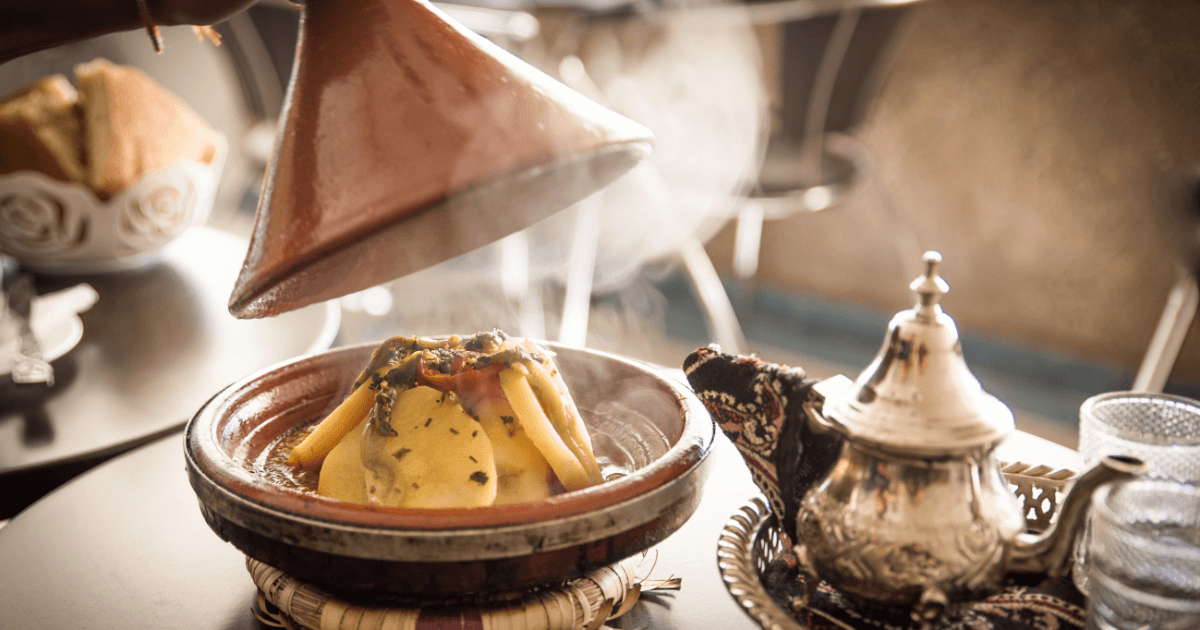Traditional Moroccan foods are more than just food. They connect us to our deep heritage and roots. These recipes are not just meals. They’re a part of who we are, bringing us closer to our past and each other.
They are foods and stories that have been passed down through generations. And by keeping them alive, we keep our culture strong. It’s like holding on to a piece of our history that everyone can taste and feel.
This effort isn’t just about food. It’s about safeguarding our identity. It ensures that the knowledge and skills of our ancestors still inspire us today. That’s the real magic of these traditional Moroccan foods.
Defining Traditional Moroccan Cuisine
Moroccan cuisine is like colorful artwork. It mixes many cultural flavors, showing its deep history and diverse land. The foods we know draw from Berber, Arab, and African influences. This creates the unique taste of Morocco in North Africa.

Moroccan Culinary Roots
The start of Moroccan food goes way back to ancient times. The Berbers added rich spices and cooked in tagines. The Arabs brought their taste for mixing sweet and salty. All this makes Moroccan food more than just meals. It’s a story of the country’s past.
Iconic foods and Flavors
Some foods in Morocco are really special. Things like couscous, tagine, and mint tea are well-known. They show off how Moroccans mix spices, veggies, and slow-cooking. Eating these foods fills you up and feels good for your spirit, too.
Traditional Moroccan foods: A Cultural Treasure
In Morocco, a vibrant culinary scene welcomes you with open arms. It’s full of dishes that go beyond just feeding you. These meals are a celebration of the country’s rich history. They have combined the wisdom of many Moroccan cooking experts over the years.
Preserving Ancient Cooking Techniques
Traditional Moroccan foods are made with techniques that date back hundreds of years. Tagines simmer for hours, while couscous is layered with flavors. Every step shows deep respect for the past. By keeping these methods alive, chefs ensure their culture lives on in taste.
Celebrating Moroccan Heritage
Moroccan foods not only taste amazing, they also tell a story. They showcase a mix of Berber, Arab, Mediterranean, and African cultures. This blend is a big part of Morocco’s heritage. Every meal is a chance for Moroccans to cherish their roots.
The Impact of Globalization

In today’s world, globalization brings both good and bad news for Morocco’s traditional food. It opens Moroccan cuisine to a wider audience. But it also brings worry that traditional dishes might get lost.
Yet, on the bright side, it helps Moroccan foods get recognized worldwide. More people get to taste Morocco’s unique flavors. This can make more people want to try authentic Moroccan foods.
But there is a downside too. The world’s fast lifestyles have made people lean towards quick, easy-to-get food. This might push traditional foods aside. It could lead to losing the true taste of Morocco’s culinary tradition.
To tackle this issue, it’s vital for Morocco to protect its culinary roots. Chefs and cultural groups must work together. They need to keep the essence of traditional dishes while also staying open to new global food ideas. This way, Morocco can keep its rich culinary heritage alive and well.
Reviving Interest in Traditional foods
Globalization poses challenges to keeping traditional foods alive. However, there is a strong effort to bring back interest in traditional Moroccan food. To ensure these recipes are not forgotten, cooking classes and workshops have gained popularity. This celebrates the country’s culinary history in a fun and engaging way.
Culinary Tourism
In Morocco, both the tourism industry and local businesses realize the value of traditional cuisine. They encourage culinary tourism as a way to showcase the unique flavors and cooking styles developed over the years. This allows visitors to dive into the exciting food scene. They can enjoy local markets, take part in cooking classes, and taste authentic Moroccan foods.
Cooking Classes and Workshops
Complementing the rise of culinary tourism is an increase in cooking classes and workshops. Their goal is to pass on the secrets of traditional Moroccan cooking. These initiatives are led by skilled chefs and culinary experts. They offer a chance for people to learn the special techniques and recipes that define Moroccan food. Participants not only learn but also carry on the tradition by sharing what they learn with others.




No comment